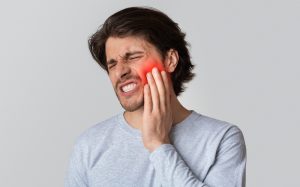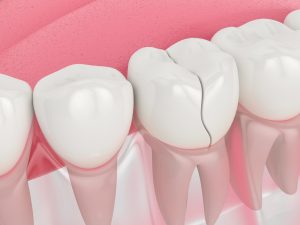What’s The Deal With Teeth Grinding?
If you’ve been experiencing a sore jaw and headaches regularly you may be dealing with teeth grinding. Teeth grinding is an incredibly common problem that can cause lasting damage to your teeth, in addition to issues such as chronic pain in the face and jaw.
Learn more about teeth grinding, the common causes, and how Sacramento, CA dentist, Dr. Scott A Grivas III can help you deal with it by dialing (916) 929-9222.
What Is Teeth Grinding?
Teeth grinding, also known as bruxism, is the involuntary grinding or clenching of teeth, usually while sleeping. According to the Journal of Conservative Dentistry, it affects millions of people worldwide, most often during childhood, adolescence, and the young adult years. While occasional teeth grinding may not cause harm, chronic bruxism can lead to serious dental and health problems.
Causes of Teeth Grinding
Stress and Anxiety 
Stress and anxiety are the most common causes of teeth grinding. When we experience stress or anxiety, our bodies respond by tensing up, including the muscles in our face and jaw. Over time, this can lead to the development of bruxism. People who are highly stressed, have anxiety disorders, or are prone to anger or frustration may be more likely to grind their teeth.
Sleep Disorders
Sleep disorders are another common cause of teeth grinding. Conditions such as sleep apnea, which causes breathing interruptions during sleep, can trigger teeth grinding. People with sleep apnea may also experience snoring, gasping, or choking during sleep.
Malocclusion
Malocclusion, or misaligned teeth, can also cause teeth grinding. When teeth don’t align properly, it can cause an uneven bite, which can lead to grinding and clenching during sleep. Similarly, missing or crooked teeth can cause the same problem.
Symptoms of Teeth Grinding
The most common symptoms of teeth grinding are:
- Grinding or clenching sounds while sleeping
- Jaw pain or soreness, especially in the morning
- Headaches, especially in the temples or behind the eyes
- Tooth sensitivity or pain, especially to hot or cold temperatures
- Tired or tight jaw muscles
- Earache-like pain, without any sign of an ear infection or problem
- Chipped, fractured, or flattened teeth
- Worn tooth enamel, exposing deeper layers of the tooth
- Gum recession, making teeth appear longer than usual
- Tongue or cheek damage, from biting down during sleep
- Increased anxiety or stress
- Jaw disorders such as TMJ Disorder
If you’ve been experiencing any symptoms of teeth grinding, visit your Sacramento dentist, Dr. Grivas. He will provide an exam to discover the origins of your symptoms. If it’s discovered that you may be experiencing teeth grinding, he’ll provide you with a custom-made night guard to protect your teeth from further damage.
Health Risks Associated With Teeth Grinding
If left untreated, teeth grinding can have serious consequences for your dental and overall health. You should seek treatment if you suspect you may be grinding your teeth to prevent further damage and discomfort.
Teeth Damage
Teeth grinding can cause significant damage to teeth, including cracking, chipping, and wearing down of enamel. In severe cases, teeth may become loose or even fall out. This damage can be expensive to repair and may require restorative dental work such as crowns or implants.
Jaw Problems
Teeth grinding can also lead to jaw problems, chronic pain, and sleep disturbances. Over time, the constant grinding and clenching can strain the muscles in the jaw and face, leading to TMJ (temporomandibular joint) disorder. This can cause pain in the jaw joint, facial muscles, neck, and shoulders, and can make it difficult to open and close the mouth.
Sleep Disturbances
The pain and discomfort associated with teeth grinding can also lead to sleep disturbances. People with bruxism may wake up frequently during the night or have trouble falling asleep due to jaw pain or discomfort. This can lead to fatigue, irritability, and decreased productivity during the day.
Gum Recession
Gum recession can occur as a result of teeth grinding. Excessive force can cause the gums to pull away from the teeth, exposing the sensitive roots and leaving the teeth vulnerable to decay and gum disease.
Prevention and Self-Care for Teeth Grinding
There are several ways to prevent teeth grinding or reduce its frequency and intensity.
- Stress management techniques, such as meditation or deep breathing, can be helpful.
- Relaxation techniques before sleep, such as taking a warm bath or practicing gentle stretching, can also be effective.
- Proper sleep hygiene, such as maintaining a regular sleep schedule and avoiding caffeine and alcohol before bedtime, can help prevent teeth grinding.
- Using a mouthguard or splint can also protect teeth from damage during sleep.
Treatment for Teeth Grinding
Patients who grind their teeth while sleeping should seek treatment as soon as possible to prevent further damage to teeth and gums and alleviate any associated pain or discomfort. Your dentist or doctor can help determine the best course of treatment for your situation, such as:
- Counseling or therapy to address underlying psychological issues
- Treating underlying sleep disorders such as sleep apnea with a CPAP machine
- Orthodontic treatment such as braces or Invisalign to realign the teeth and correct the bite
- Custom-fitted mouthguard or night guard to cushion the teeth and jaw and prevent further wear and tear
- Muscle relaxants or Botox® injections to relax the jaw muscles and reduce teeth grinding
Sleep Better, Grind Less: Treat Your Bruxism
If you’re experiencing symptoms of teeth grinding or have noticed signs of wear and tear on your teeth, it’s important to seek treatment from Dr. Grivas. Don’t let teeth grinding go untreated – schedule an appointment with Dr. Grivas today by dialing (916) 929-9222. We proudly serve new and returning patients from Sacramento and surrounding areas such as La Riviera, West Sacramento, Florin, and Rosemont, CA.





